Understanding Knowledge Management Strategies: A Case Study Report
VerifiedAdded on 2021/01/01
|8
|2516
|132
Report
AI Summary
This report presents an analysis of a case study focusing on knowledge management strategies and their impact on organizational performance, drawing from the article "Understanding the effect of knowledge management strategies on knowledge management performance: A contingency perspective." The report begins with an overview of the case study, which examines the effectiveness of knowledge management strategies based on internal and external contextual conditions. It then reviews relevant literature on knowledge management strategies, discussing the four main types: external codification, external personalization, internal codification, and internal personalization, along with the contingency model. The report also reviews knowledge management systems, defining them as information systems used for knowledge retrieval, location, and capture, and discusses various examples such as data mining and AI tools. Furthermore, the report includes a critical discussion comparing the case study's findings with the review of knowledge management systems, highlighting how knowledge management strategies play a vital role in organizational performance by improving the gathering, sharing, and use of knowledge from internal and external sources, ultimately helping businesses gain a competitive advantage. The report concludes by emphasizing the importance of knowledge management in sharing, creating, and utilizing organizational knowledge.
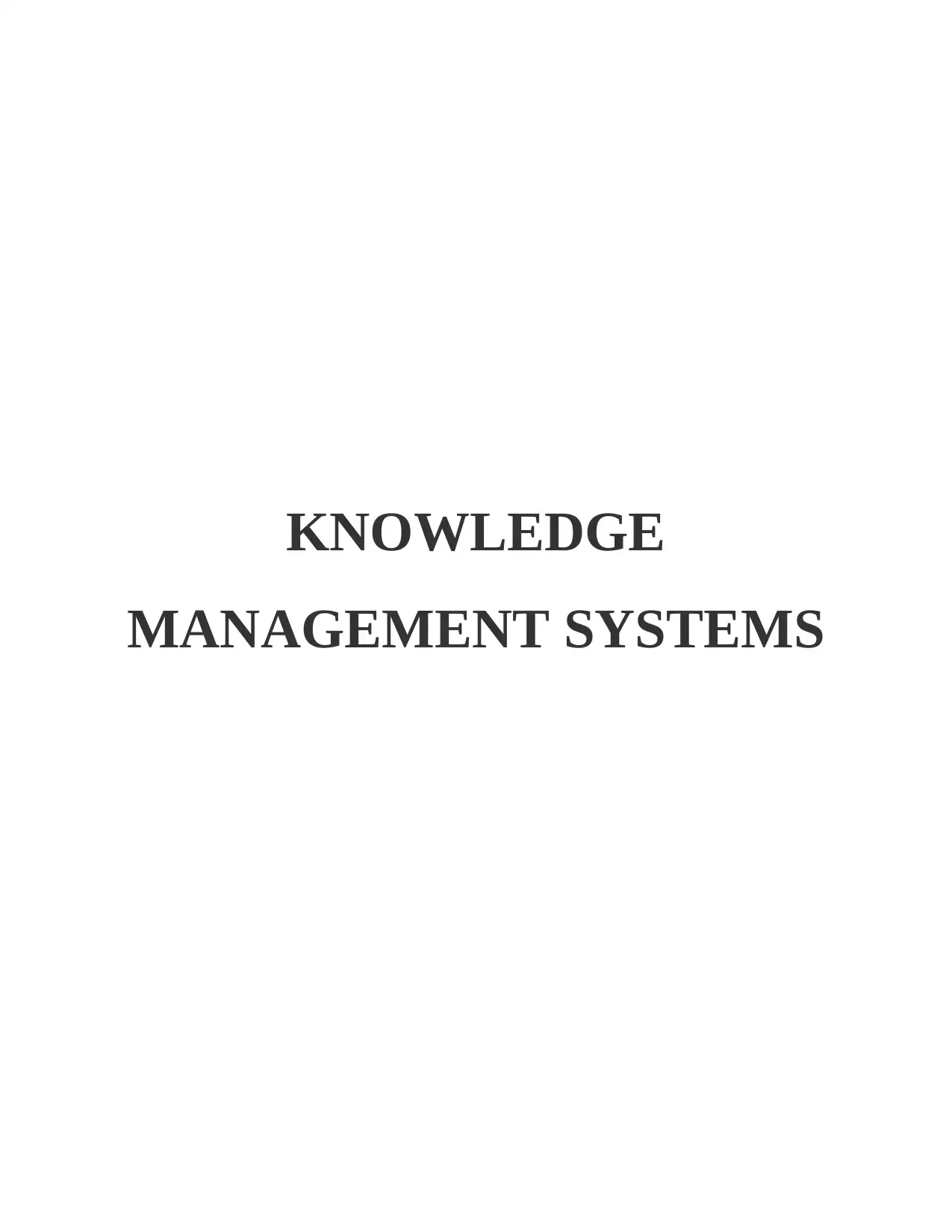
KNOWLEDGE
MANAGEMENT SYSTEMS
MANAGEMENT SYSTEMS
Paraphrase This Document
Need a fresh take? Get an instant paraphrase of this document with our AI Paraphraser
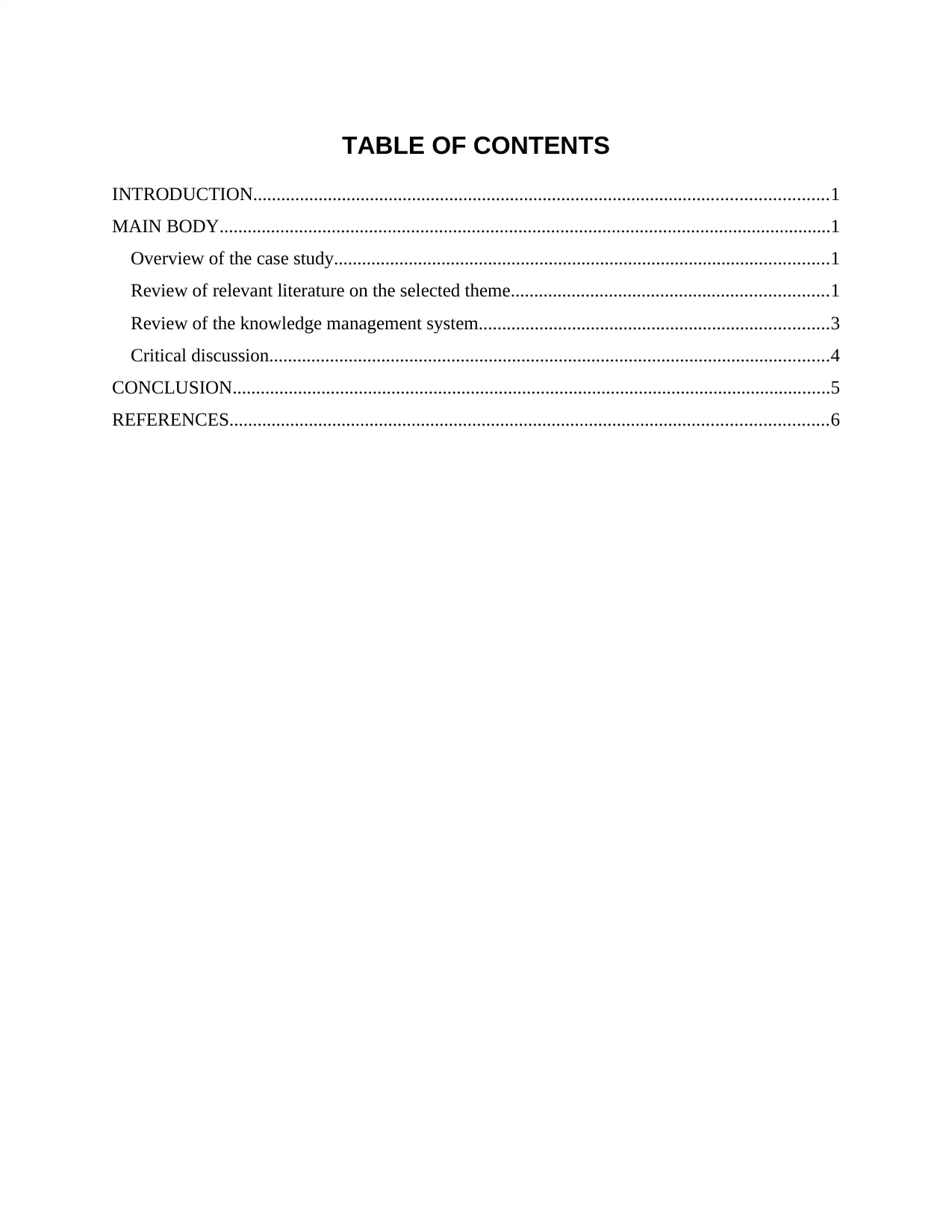
TABLE OF CONTENTS
INTRODUCTION...........................................................................................................................1
MAIN BODY...................................................................................................................................1
Overview of the case study..........................................................................................................1
Review of relevant literature on the selected theme....................................................................1
Review of the knowledge management system...........................................................................3
Critical discussion........................................................................................................................4
CONCLUSION................................................................................................................................5
REFERENCES................................................................................................................................6
INTRODUCTION...........................................................................................................................1
MAIN BODY...................................................................................................................................1
Overview of the case study..........................................................................................................1
Review of relevant literature on the selected theme....................................................................1
Review of the knowledge management system...........................................................................3
Critical discussion........................................................................................................................4
CONCLUSION................................................................................................................................5
REFERENCES................................................................................................................................6
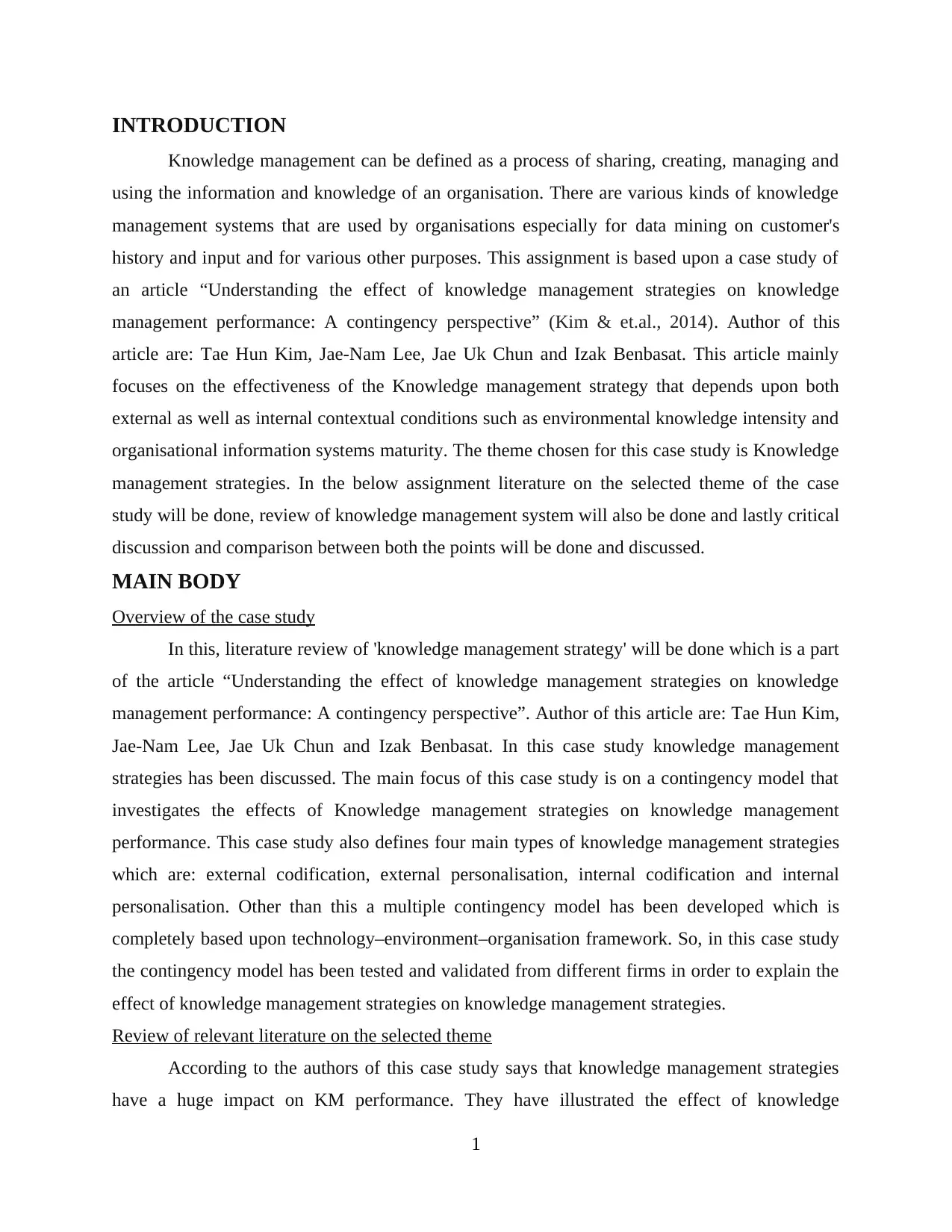
INTRODUCTION
Knowledge management can be defined as a process of sharing, creating, managing and
using the information and knowledge of an organisation. There are various kinds of knowledge
management systems that are used by organisations especially for data mining on customer's
history and input and for various other purposes. This assignment is based upon a case study of
an article “Understanding the effect of knowledge management strategies on knowledge
management performance: A contingency perspective” (Kim & et.al., 2014). Author of this
article are: Tae Hun Kim, Jae-Nam Lee, Jae Uk Chun and Izak Benbasat. This article mainly
focuses on the effectiveness of the Knowledge management strategy that depends upon both
external as well as internal contextual conditions such as environmental knowledge intensity and
organisational information systems maturity. The theme chosen for this case study is Knowledge
management strategies. In the below assignment literature on the selected theme of the case
study will be done, review of knowledge management system will also be done and lastly critical
discussion and comparison between both the points will be done and discussed.
MAIN BODY
Overview of the case study
In this, literature review of 'knowledge management strategy' will be done which is a part
of the article “Understanding the effect of knowledge management strategies on knowledge
management performance: A contingency perspective”. Author of this article are: Tae Hun Kim,
Jae-Nam Lee, Jae Uk Chun and Izak Benbasat. In this case study knowledge management
strategies has been discussed. The main focus of this case study is on a contingency model that
investigates the effects of Knowledge management strategies on knowledge management
performance. This case study also defines four main types of knowledge management strategies
which are: external codification, external personalisation, internal codification and internal
personalisation. Other than this a multiple contingency model has been developed which is
completely based upon technology–environment–organisation framework. So, in this case study
the contingency model has been tested and validated from different firms in order to explain the
effect of knowledge management strategies on knowledge management strategies.
Review of relevant literature on the selected theme
According to the authors of this case study says that knowledge management strategies
have a huge impact on KM performance. They have illustrated the effect of knowledge
1
Knowledge management can be defined as a process of sharing, creating, managing and
using the information and knowledge of an organisation. There are various kinds of knowledge
management systems that are used by organisations especially for data mining on customer's
history and input and for various other purposes. This assignment is based upon a case study of
an article “Understanding the effect of knowledge management strategies on knowledge
management performance: A contingency perspective” (Kim & et.al., 2014). Author of this
article are: Tae Hun Kim, Jae-Nam Lee, Jae Uk Chun and Izak Benbasat. This article mainly
focuses on the effectiveness of the Knowledge management strategy that depends upon both
external as well as internal contextual conditions such as environmental knowledge intensity and
organisational information systems maturity. The theme chosen for this case study is Knowledge
management strategies. In the below assignment literature on the selected theme of the case
study will be done, review of knowledge management system will also be done and lastly critical
discussion and comparison between both the points will be done and discussed.
MAIN BODY
Overview of the case study
In this, literature review of 'knowledge management strategy' will be done which is a part
of the article “Understanding the effect of knowledge management strategies on knowledge
management performance: A contingency perspective”. Author of this article are: Tae Hun Kim,
Jae-Nam Lee, Jae Uk Chun and Izak Benbasat. In this case study knowledge management
strategies has been discussed. The main focus of this case study is on a contingency model that
investigates the effects of Knowledge management strategies on knowledge management
performance. This case study also defines four main types of knowledge management strategies
which are: external codification, external personalisation, internal codification and internal
personalisation. Other than this a multiple contingency model has been developed which is
completely based upon technology–environment–organisation framework. So, in this case study
the contingency model has been tested and validated from different firms in order to explain the
effect of knowledge management strategies on knowledge management strategies.
Review of relevant literature on the selected theme
According to the authors of this case study says that knowledge management strategies
have a huge impact on KM performance. They have illustrated the effect of knowledge
1
⊘ This is a preview!⊘
Do you want full access?
Subscribe today to unlock all pages.

Trusted by 1+ million students worldwide
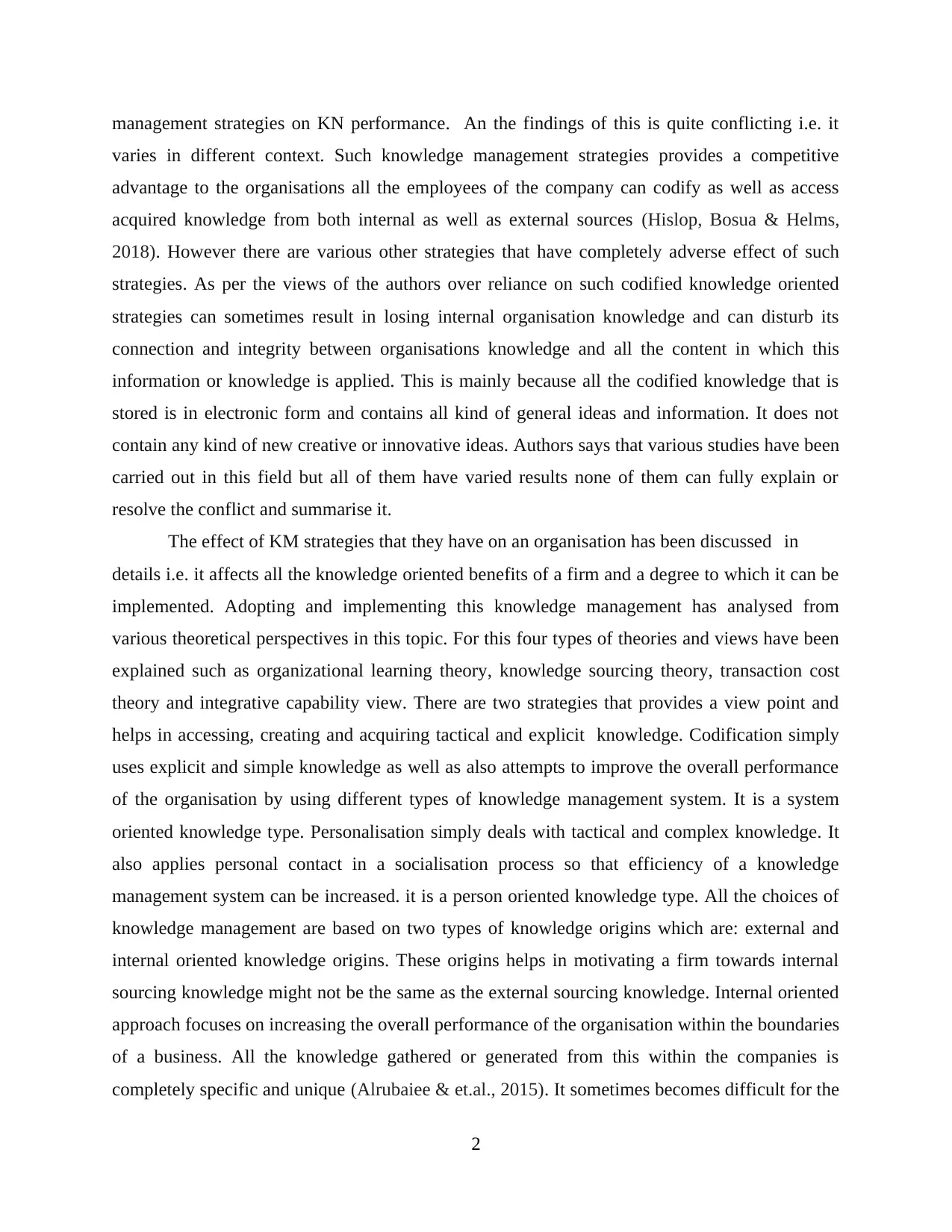
management strategies on KN performance. An the findings of this is quite conflicting i.e. it
varies in different context. Such knowledge management strategies provides a competitive
advantage to the organisations all the employees of the company can codify as well as access
acquired knowledge from both internal as well as external sources (Hislop, Bosua & Helms,
2018). However there are various other strategies that have completely adverse effect of such
strategies. As per the views of the authors over reliance on such codified knowledge oriented
strategies can sometimes result in losing internal organisation knowledge and can disturb its
connection and integrity between organisations knowledge and all the content in which this
information or knowledge is applied. This is mainly because all the codified knowledge that is
stored is in electronic form and contains all kind of general ideas and information. It does not
contain any kind of new creative or innovative ideas. Authors says that various studies have been
carried out in this field but all of them have varied results none of them can fully explain or
resolve the conflict and summarise it.
The effect of KM strategies that they have on an organisation has been discussed in
details i.e. it affects all the knowledge oriented benefits of a firm and a degree to which it can be
implemented. Adopting and implementing this knowledge management has analysed from
various theoretical perspectives in this topic. For this four types of theories and views have been
explained such as organizational learning theory, knowledge sourcing theory, transaction cost
theory and integrative capability view. There are two strategies that provides a view point and
helps in accessing, creating and acquiring tactical and explicit knowledge. Codification simply
uses explicit and simple knowledge as well as also attempts to improve the overall performance
of the organisation by using different types of knowledge management system. It is a system
oriented knowledge type. Personalisation simply deals with tactical and complex knowledge. It
also applies personal contact in a socialisation process so that efficiency of a knowledge
management system can be increased. it is a person oriented knowledge type. All the choices of
knowledge management are based on two types of knowledge origins which are: external and
internal oriented knowledge origins. These origins helps in motivating a firm towards internal
sourcing knowledge might not be the same as the external sourcing knowledge. Internal oriented
approach focuses on increasing the overall performance of the organisation within the boundaries
of a business. All the knowledge gathered or generated from this within the companies is
completely specific and unique (Alrubaiee & et.al., 2015). It sometimes becomes difficult for the
2
varies in different context. Such knowledge management strategies provides a competitive
advantage to the organisations all the employees of the company can codify as well as access
acquired knowledge from both internal as well as external sources (Hislop, Bosua & Helms,
2018). However there are various other strategies that have completely adverse effect of such
strategies. As per the views of the authors over reliance on such codified knowledge oriented
strategies can sometimes result in losing internal organisation knowledge and can disturb its
connection and integrity between organisations knowledge and all the content in which this
information or knowledge is applied. This is mainly because all the codified knowledge that is
stored is in electronic form and contains all kind of general ideas and information. It does not
contain any kind of new creative or innovative ideas. Authors says that various studies have been
carried out in this field but all of them have varied results none of them can fully explain or
resolve the conflict and summarise it.
The effect of KM strategies that they have on an organisation has been discussed in
details i.e. it affects all the knowledge oriented benefits of a firm and a degree to which it can be
implemented. Adopting and implementing this knowledge management has analysed from
various theoretical perspectives in this topic. For this four types of theories and views have been
explained such as organizational learning theory, knowledge sourcing theory, transaction cost
theory and integrative capability view. There are two strategies that provides a view point and
helps in accessing, creating and acquiring tactical and explicit knowledge. Codification simply
uses explicit and simple knowledge as well as also attempts to improve the overall performance
of the organisation by using different types of knowledge management system. It is a system
oriented knowledge type. Personalisation simply deals with tactical and complex knowledge. It
also applies personal contact in a socialisation process so that efficiency of a knowledge
management system can be increased. it is a person oriented knowledge type. All the choices of
knowledge management are based on two types of knowledge origins which are: external and
internal oriented knowledge origins. These origins helps in motivating a firm towards internal
sourcing knowledge might not be the same as the external sourcing knowledge. Internal oriented
approach focuses on increasing the overall performance of the organisation within the boundaries
of a business. All the knowledge gathered or generated from this within the companies is
completely specific and unique (Alrubaiee & et.al., 2015). It sometimes becomes difficult for the
2
Paraphrase This Document
Need a fresh take? Get an instant paraphrase of this document with our AI Paraphraser
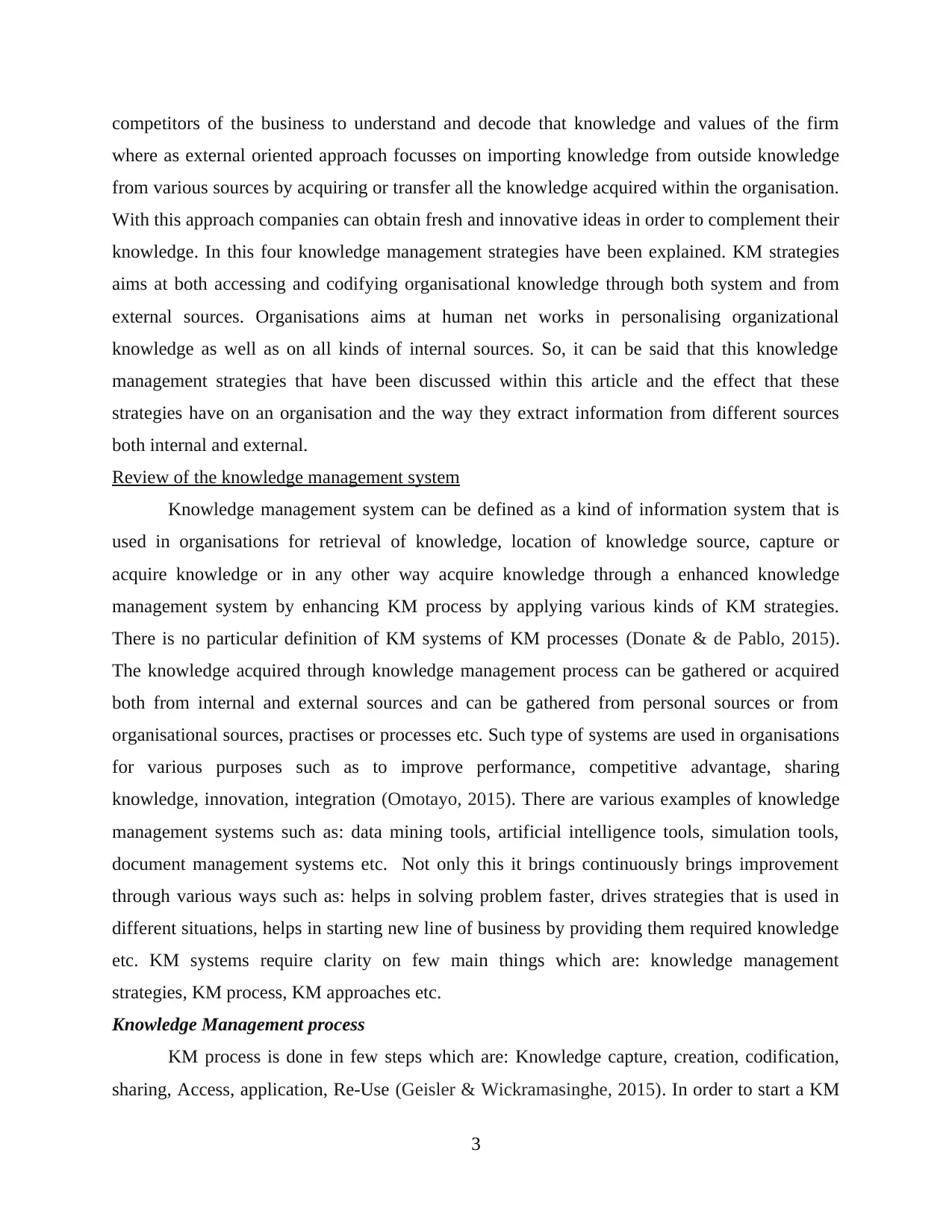
competitors of the business to understand and decode that knowledge and values of the firm
where as external oriented approach focusses on importing knowledge from outside knowledge
from various sources by acquiring or transfer all the knowledge acquired within the organisation.
With this approach companies can obtain fresh and innovative ideas in order to complement their
knowledge. In this four knowledge management strategies have been explained. KM strategies
aims at both accessing and codifying organisational knowledge through both system and from
external sources. Organisations aims at human net works in personalising organizational
knowledge as well as on all kinds of internal sources. So, it can be said that this knowledge
management strategies that have been discussed within this article and the effect that these
strategies have on an organisation and the way they extract information from different sources
both internal and external.
Review of the knowledge management system
Knowledge management system can be defined as a kind of information system that is
used in organisations for retrieval of knowledge, location of knowledge source, capture or
acquire knowledge or in any other way acquire knowledge through a enhanced knowledge
management system by enhancing KM process by applying various kinds of KM strategies.
There is no particular definition of KM systems of KM processes (Donate & de Pablo, 2015).
The knowledge acquired through knowledge management process can be gathered or acquired
both from internal and external sources and can be gathered from personal sources or from
organisational sources, practises or processes etc. Such type of systems are used in organisations
for various purposes such as to improve performance, competitive advantage, sharing
knowledge, innovation, integration (Omotayo, 2015). There are various examples of knowledge
management systems such as: data mining tools, artificial intelligence tools, simulation tools,
document management systems etc. Not only this it brings continuously brings improvement
through various ways such as: helps in solving problem faster, drives strategies that is used in
different situations, helps in starting new line of business by providing them required knowledge
etc. KM systems require clarity on few main things which are: knowledge management
strategies, KM process, KM approaches etc.
Knowledge Management process
KM process is done in few steps which are: Knowledge capture, creation, codification,
sharing, Access, application, Re-Use (Geisler & Wickramasinghe, 2015). In order to start a KM
3
where as external oriented approach focusses on importing knowledge from outside knowledge
from various sources by acquiring or transfer all the knowledge acquired within the organisation.
With this approach companies can obtain fresh and innovative ideas in order to complement their
knowledge. In this four knowledge management strategies have been explained. KM strategies
aims at both accessing and codifying organisational knowledge through both system and from
external sources. Organisations aims at human net works in personalising organizational
knowledge as well as on all kinds of internal sources. So, it can be said that this knowledge
management strategies that have been discussed within this article and the effect that these
strategies have on an organisation and the way they extract information from different sources
both internal and external.
Review of the knowledge management system
Knowledge management system can be defined as a kind of information system that is
used in organisations for retrieval of knowledge, location of knowledge source, capture or
acquire knowledge or in any other way acquire knowledge through a enhanced knowledge
management system by enhancing KM process by applying various kinds of KM strategies.
There is no particular definition of KM systems of KM processes (Donate & de Pablo, 2015).
The knowledge acquired through knowledge management process can be gathered or acquired
both from internal and external sources and can be gathered from personal sources or from
organisational sources, practises or processes etc. Such type of systems are used in organisations
for various purposes such as to improve performance, competitive advantage, sharing
knowledge, innovation, integration (Omotayo, 2015). There are various examples of knowledge
management systems such as: data mining tools, artificial intelligence tools, simulation tools,
document management systems etc. Not only this it brings continuously brings improvement
through various ways such as: helps in solving problem faster, drives strategies that is used in
different situations, helps in starting new line of business by providing them required knowledge
etc. KM systems require clarity on few main things which are: knowledge management
strategies, KM process, KM approaches etc.
Knowledge Management process
KM process is done in few steps which are: Knowledge capture, creation, codification,
sharing, Access, application, Re-Use (Geisler & Wickramasinghe, 2015). In order to start a KM
3
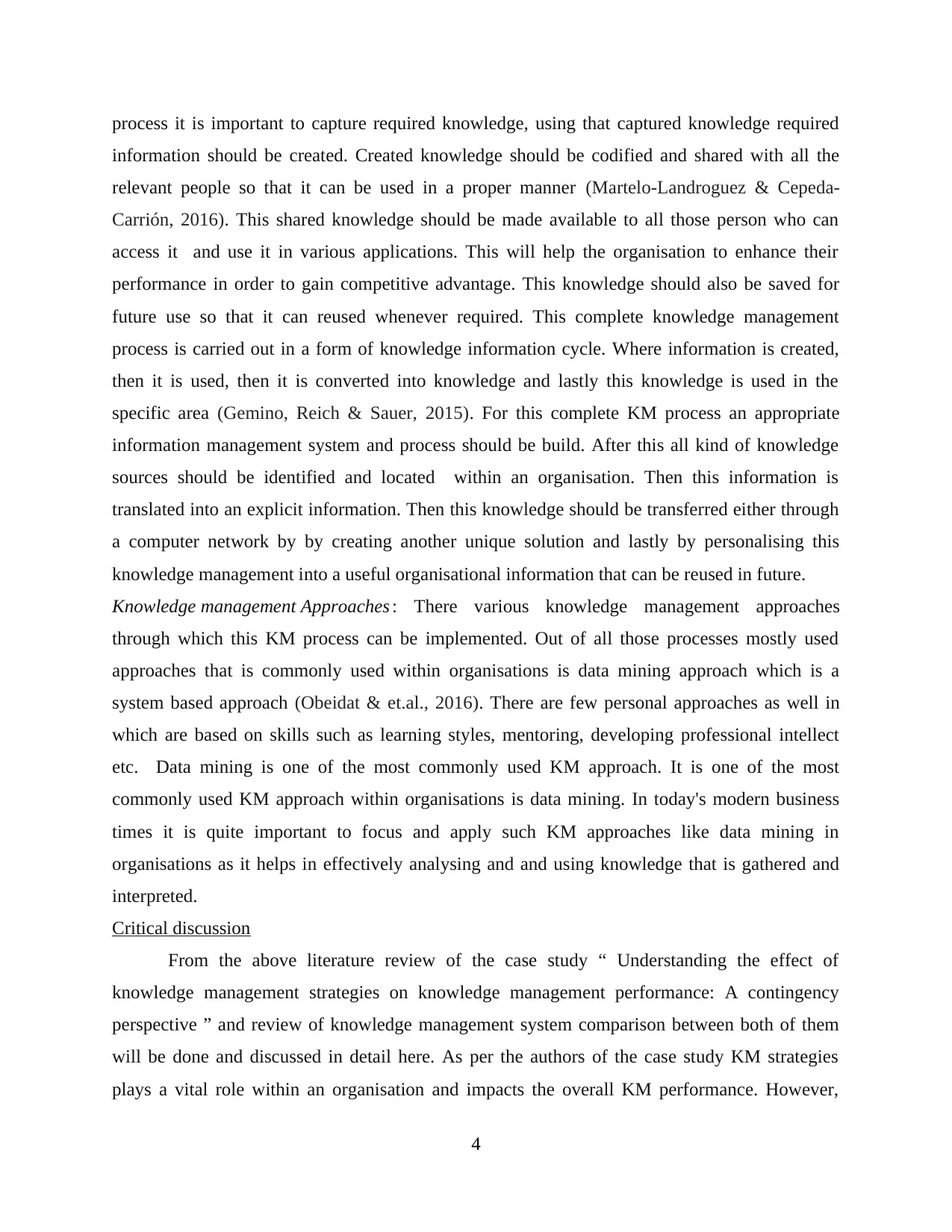
process it is important to capture required knowledge, using that captured knowledge required
information should be created. Created knowledge should be codified and shared with all the
relevant people so that it can be used in a proper manner (Martelo-Landroguez & Cepeda-
Carrión, 2016). This shared knowledge should be made available to all those person who can
access it and use it in various applications. This will help the organisation to enhance their
performance in order to gain competitive advantage. This knowledge should also be saved for
future use so that it can reused whenever required. This complete knowledge management
process is carried out in a form of knowledge information cycle. Where information is created,
then it is used, then it is converted into knowledge and lastly this knowledge is used in the
specific area (Gemino, Reich & Sauer, 2015). For this complete KM process an appropriate
information management system and process should be build. After this all kind of knowledge
sources should be identified and located within an organisation. Then this information is
translated into an explicit information. Then this knowledge should be transferred either through
a computer network by by creating another unique solution and lastly by personalising this
knowledge management into a useful organisational information that can be reused in future.
Knowledge management Approaches : There various knowledge management approaches
through which this KM process can be implemented. Out of all those processes mostly used
approaches that is commonly used within organisations is data mining approach which is a
system based approach (Obeidat & et.al., 2016). There are few personal approaches as well in
which are based on skills such as learning styles, mentoring, developing professional intellect
etc. Data mining is one of the most commonly used KM approach. It is one of the most
commonly used KM approach within organisations is data mining. In today's modern business
times it is quite important to focus and apply such KM approaches like data mining in
organisations as it helps in effectively analysing and and using knowledge that is gathered and
interpreted.
Critical discussion
From the above literature review of the case study “ Understanding the effect of
knowledge management strategies on knowledge management performance: A contingency
perspective ” and review of knowledge management system comparison between both of them
will be done and discussed in detail here. As per the authors of the case study KM strategies
plays a vital role within an organisation and impacts the overall KM performance. However,
4
information should be created. Created knowledge should be codified and shared with all the
relevant people so that it can be used in a proper manner (Martelo-Landroguez & Cepeda-
Carrión, 2016). This shared knowledge should be made available to all those person who can
access it and use it in various applications. This will help the organisation to enhance their
performance in order to gain competitive advantage. This knowledge should also be saved for
future use so that it can reused whenever required. This complete knowledge management
process is carried out in a form of knowledge information cycle. Where information is created,
then it is used, then it is converted into knowledge and lastly this knowledge is used in the
specific area (Gemino, Reich & Sauer, 2015). For this complete KM process an appropriate
information management system and process should be build. After this all kind of knowledge
sources should be identified and located within an organisation. Then this information is
translated into an explicit information. Then this knowledge should be transferred either through
a computer network by by creating another unique solution and lastly by personalising this
knowledge management into a useful organisational information that can be reused in future.
Knowledge management Approaches : There various knowledge management approaches
through which this KM process can be implemented. Out of all those processes mostly used
approaches that is commonly used within organisations is data mining approach which is a
system based approach (Obeidat & et.al., 2016). There are few personal approaches as well in
which are based on skills such as learning styles, mentoring, developing professional intellect
etc. Data mining is one of the most commonly used KM approach. It is one of the most
commonly used KM approach within organisations is data mining. In today's modern business
times it is quite important to focus and apply such KM approaches like data mining in
organisations as it helps in effectively analysing and and using knowledge that is gathered and
interpreted.
Critical discussion
From the above literature review of the case study “ Understanding the effect of
knowledge management strategies on knowledge management performance: A contingency
perspective ” and review of knowledge management system comparison between both of them
will be done and discussed in detail here. As per the authors of the case study KM strategies
plays a vital role within an organisation and impacts the overall KM performance. However,
4
⊘ This is a preview!⊘
Do you want full access?
Subscribe today to unlock all pages.

Trusted by 1+ million students worldwide
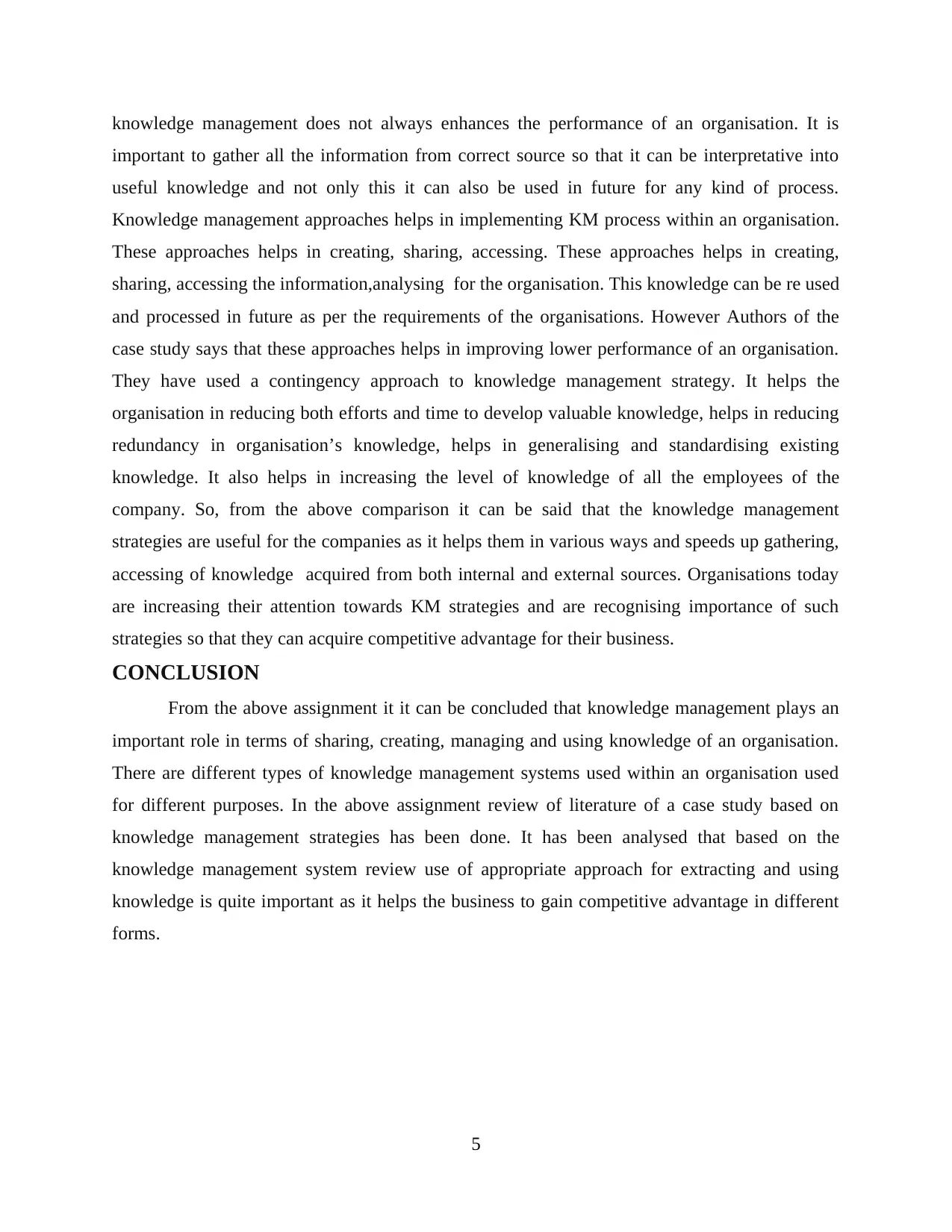
knowledge management does not always enhances the performance of an organisation. It is
important to gather all the information from correct source so that it can be interpretative into
useful knowledge and not only this it can also be used in future for any kind of process.
Knowledge management approaches helps in implementing KM process within an organisation.
These approaches helps in creating, sharing, accessing. These approaches helps in creating,
sharing, accessing the information,analysing for the organisation. This knowledge can be re used
and processed in future as per the requirements of the organisations. However Authors of the
case study says that these approaches helps in improving lower performance of an organisation.
They have used a contingency approach to knowledge management strategy. It helps the
organisation in reducing both efforts and time to develop valuable knowledge, helps in reducing
redundancy in organisation’s knowledge, helps in generalising and standardising existing
knowledge. It also helps in increasing the level of knowledge of all the employees of the
company. So, from the above comparison it can be said that the knowledge management
strategies are useful for the companies as it helps them in various ways and speeds up gathering,
accessing of knowledge acquired from both internal and external sources. Organisations today
are increasing their attention towards KM strategies and are recognising importance of such
strategies so that they can acquire competitive advantage for their business.
CONCLUSION
From the above assignment it it can be concluded that knowledge management plays an
important role in terms of sharing, creating, managing and using knowledge of an organisation.
There are different types of knowledge management systems used within an organisation used
for different purposes. In the above assignment review of literature of a case study based on
knowledge management strategies has been done. It has been analysed that based on the
knowledge management system review use of appropriate approach for extracting and using
knowledge is quite important as it helps the business to gain competitive advantage in different
forms.
5
important to gather all the information from correct source so that it can be interpretative into
useful knowledge and not only this it can also be used in future for any kind of process.
Knowledge management approaches helps in implementing KM process within an organisation.
These approaches helps in creating, sharing, accessing. These approaches helps in creating,
sharing, accessing the information,analysing for the organisation. This knowledge can be re used
and processed in future as per the requirements of the organisations. However Authors of the
case study says that these approaches helps in improving lower performance of an organisation.
They have used a contingency approach to knowledge management strategy. It helps the
organisation in reducing both efforts and time to develop valuable knowledge, helps in reducing
redundancy in organisation’s knowledge, helps in generalising and standardising existing
knowledge. It also helps in increasing the level of knowledge of all the employees of the
company. So, from the above comparison it can be said that the knowledge management
strategies are useful for the companies as it helps them in various ways and speeds up gathering,
accessing of knowledge acquired from both internal and external sources. Organisations today
are increasing their attention towards KM strategies and are recognising importance of such
strategies so that they can acquire competitive advantage for their business.
CONCLUSION
From the above assignment it it can be concluded that knowledge management plays an
important role in terms of sharing, creating, managing and using knowledge of an organisation.
There are different types of knowledge management systems used within an organisation used
for different purposes. In the above assignment review of literature of a case study based on
knowledge management strategies has been done. It has been analysed that based on the
knowledge management system review use of appropriate approach for extracting and using
knowledge is quite important as it helps the business to gain competitive advantage in different
forms.
5
Paraphrase This Document
Need a fresh take? Get an instant paraphrase of this document with our AI Paraphraser
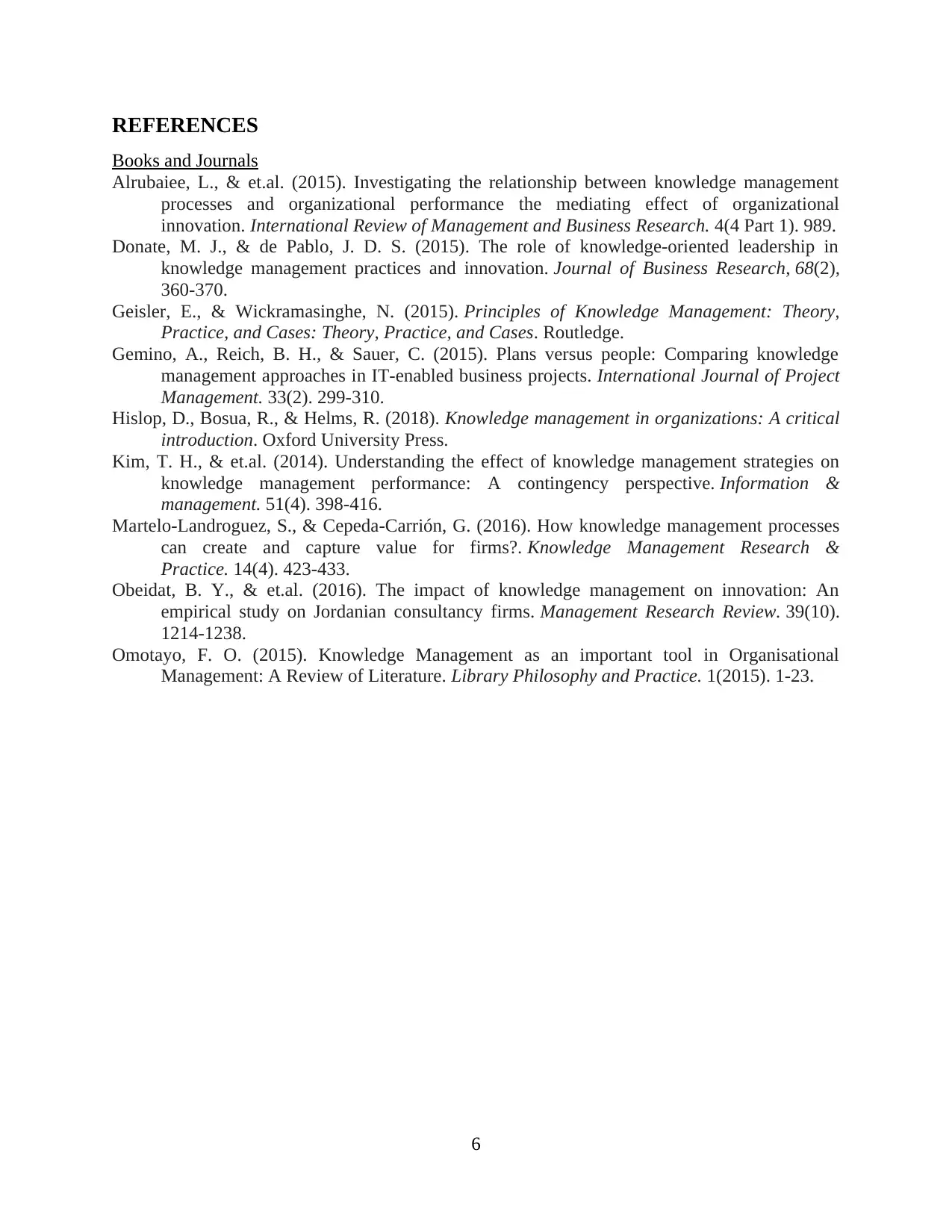
REFERENCES
Books and Journals
Alrubaiee, L., & et.al. (2015). Investigating the relationship between knowledge management
processes and organizational performance the mediating effect of organizational
innovation. International Review of Management and Business Research. 4(4 Part 1). 989.
Donate, M. J., & de Pablo, J. D. S. (2015). The role of knowledge-oriented leadership in
knowledge management practices and innovation. Journal of Business Research, 68(2),
360-370.
Geisler, E., & Wickramasinghe, N. (2015). Principles of Knowledge Management: Theory,
Practice, and Cases: Theory, Practice, and Cases. Routledge.
Gemino, A., Reich, B. H., & Sauer, C. (2015). Plans versus people: Comparing knowledge
management approaches in IT-enabled business projects. International Journal of Project
Management. 33(2). 299-310.
Hislop, D., Bosua, R., & Helms, R. (2018). Knowledge management in organizations: A critical
introduction. Oxford University Press.
Kim, T. H., & et.al. (2014). Understanding the effect of knowledge management strategies on
knowledge management performance: A contingency perspective. Information &
management. 51(4). 398-416.
Martelo-Landroguez, S., & Cepeda-Carrión, G. (2016). How knowledge management processes
can create and capture value for firms?. Knowledge Management Research &
Practice. 14(4). 423-433.
Obeidat, B. Y., & et.al. (2016). The impact of knowledge management on innovation: An
empirical study on Jordanian consultancy firms. Management Research Review. 39(10).
1214-1238.
Omotayo, F. O. (2015). Knowledge Management as an important tool in Organisational
Management: A Review of Literature. Library Philosophy and Practice. 1(2015). 1-23.
6
Books and Journals
Alrubaiee, L., & et.al. (2015). Investigating the relationship between knowledge management
processes and organizational performance the mediating effect of organizational
innovation. International Review of Management and Business Research. 4(4 Part 1). 989.
Donate, M. J., & de Pablo, J. D. S. (2015). The role of knowledge-oriented leadership in
knowledge management practices and innovation. Journal of Business Research, 68(2),
360-370.
Geisler, E., & Wickramasinghe, N. (2015). Principles of Knowledge Management: Theory,
Practice, and Cases: Theory, Practice, and Cases. Routledge.
Gemino, A., Reich, B. H., & Sauer, C. (2015). Plans versus people: Comparing knowledge
management approaches in IT-enabled business projects. International Journal of Project
Management. 33(2). 299-310.
Hislop, D., Bosua, R., & Helms, R. (2018). Knowledge management in organizations: A critical
introduction. Oxford University Press.
Kim, T. H., & et.al. (2014). Understanding the effect of knowledge management strategies on
knowledge management performance: A contingency perspective. Information &
management. 51(4). 398-416.
Martelo-Landroguez, S., & Cepeda-Carrión, G. (2016). How knowledge management processes
can create and capture value for firms?. Knowledge Management Research &
Practice. 14(4). 423-433.
Obeidat, B. Y., & et.al. (2016). The impact of knowledge management on innovation: An
empirical study on Jordanian consultancy firms. Management Research Review. 39(10).
1214-1238.
Omotayo, F. O. (2015). Knowledge Management as an important tool in Organisational
Management: A Review of Literature. Library Philosophy and Practice. 1(2015). 1-23.
6
1 out of 8
Your All-in-One AI-Powered Toolkit for Academic Success.
+13062052269
info@desklib.com
Available 24*7 on WhatsApp / Email
![[object Object]](/_next/static/media/star-bottom.7253800d.svg)
Unlock your academic potential
Copyright © 2020–2026 A2Z Services. All Rights Reserved. Developed and managed by ZUCOL.
